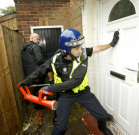- Home
- Videos
- Links
- Working with Interpreters
- Favorite Products
-
Newsletters
- December 2017
- December 2014
- June 2014
- March 2014
- December 2013
- November 2013
- October 2013 Newsletter
- July 2013 Newsletter
- June 2013 Newsletter
- March 2013
- February 2013
- January 2013
- December 2012
- November 2012
- October 2012
- September 2012
- August 2012
- July 2012
- June 2012
- May 2012
- April 2012
- March 2012
- February 2012
- January 2012
- November 2011
- October 2011
- September 2011
- August 2011
- July 2011
- March 2011
- February 2011
- January 2011
- October 2010
- September 2010
- May 2010
- April 2010
- March 2010
- September 2009
- May 2009 Remastered
- April 2009 Remastered
- February 2009 Remastered
- Healthy Body and Soul
- Upcoming Seminars
- More...
- COVID info for Medical interpreters
February 2013 Newsletter
In this edition:
Definitions of Detained, Arrested, Incommunicado
Settlements are Not all the Same
Weapons: Possessing and Carrying
What is "Filiación"
Phrases with Some Bite in Them
Parts of a Police Investigation
Bilingual Glossary
Tips for Healthy Body and Soul
This Month's Favorite Links
Arrestado, Detenido, Incomunicado

Custody of an Inanimate Object (tenenicia):
Custody is the keeping, guarding, caring, watching, inspecting, preserving, or securing of a thing. Custody carries with it the idea that the thing is within the immediate personal care and control of the person whose custody it is under.
A Person in-Custody:
A person in-custody is not only physically restrained but also, by virtue of restriction of liberty, has a diminished capacity to withstand the influences of others (this definition coincides with the Spanish term incomunicado.) Custody implies a relationship of dependency; the person cannot walk away.
Detention: (detención):
A detention is a non-consensual temporary denial of liberty. A police officer must have reasonable suspicion that a crime or a violation has occured in order to detain a person. During a detention, absent certain circumstances, a police officer may not move the person to another location or the detention becomes a de facto arrest.
Definition of Arrest (arresto):
To stop; to seize; to deprive one of liberty by virtue of legal authority
The purpose of an arrest is to bring the arrested person before a court or otherwise secure the administration of the law. An arrest serves the function of notifying the community that an individual has been accused of a crime and also may admonish and deter the arrested individual from committing other crimes. Arrests can be made on both criminal charges and civil charges, although civil arrest is a drastic measure that is not looked upon with favor by the courts. The federal Constitution imposes limits on both civil and criminal arrests.
An arrest may occur (1) by the touching or putting hands on the arrested person; (2) by any act that indicates an intention to take the arrested person into custody and that subjects the arrested person to the actual control and will of the person making the arrest; or (3) by the consent of the person to be arrested. There is no arrest where there is no restraint, and the restraint must be under real or pretended legal authority. However, the detention of a person need not be accompanied by formal words of arrest or a police-station booking to constitute an arrest.
Who May Arrest and By What Authority:
An offender may be arrested with or without a warrant. First, an arrest may be made without a warrant by a private individual or by a law-enforcement officer. Private individuals are enjoined by law to arrest an offender when present at the time a felony is committed, or a dangerous wound given.
Law-enforcement officers may, a fortiori, make an arrest for a crime or misdemeanor committed in their view, without any warrant. Therefore, an arrest may be made by a constable, a probation officer, a justice of the peace, sheriff, or coroner. Secondly, an arrest may be made by virtue of a warrant, which is the proper course when the circumstances of the case will permit it.
Who May Be Arrested:
Generally all persons properly accused of a crime or misdemeanor may be arrested; by the laws of the United States, ambassadors and other public ministers are exempt from arrest.
Matter of Law (from LectLaw.com):
Whether a detention is an investigatory stop or a full-blown arrest is a question of law subject review. See U.S. v. Diaz-Lizaraza, 981 F.2d 1216, 20-22 (11th Cir.'93). The Courts have stated that in the effort of determining when a person is arrested, we should ask at what point, 'in view of all the circumstances surrounding the incident, a reasonable person would have believed he or she was not free to leave; U.S. v. Hastamorir, 881 F.2d 1551, 1556 (11th Cir.'89) (quoting U.S. v. Hammock, 860 F.2d 390, 93 (11th Cir.'88)); see also U.S. v. Vargas, 643 F.2d 296, 98 (5th Cir. Unit B'81); 2 John Wesley Hall, Jr., Search and Seizure 22:3 at p.87 (2d ed. '93).
Strictly speaking, an investigatory stop is not an arrest despite the fact that a reasonable person would believe he or she is not free to leave.' (U.S. v. Hastamorir, 881 F.2d at 1556). Please refer to the proper sources for more information.
Incommunicado in English means not wanting or not being able to communicate with others. This is not the same definition as in Spanish.
In Spanish incomunicado means to be detained or in-custody.
Significado de detener: Parar una cosa, impedir que siga en movimiento; Impedir el desarrollo de una acción, suspenderlo; Persona detenida, incomunicada
Arrestar, apresar: “queda usted detenido” luego, "se lo llevaron arrestado"
Custody is the keeping, guarding, caring, watching, inspecting, preserving, or securing of a thing. Custody carries with it the idea that the thing is within the immediate personal care and control of the person whose custody it is under.
A Person in-Custody:
A person in-custody is not only physically restrained but also, by virtue of restriction of liberty, has a diminished capacity to withstand the influences of others (this definition coincides with the Spanish term incomunicado.) Custody implies a relationship of dependency; the person cannot walk away.
Detention: (detención):
A detention is a non-consensual temporary denial of liberty. A police officer must have reasonable suspicion that a crime or a violation has occured in order to detain a person. During a detention, absent certain circumstances, a police officer may not move the person to another location or the detention becomes a de facto arrest.
Definition of Arrest (arresto):
To stop; to seize; to deprive one of liberty by virtue of legal authority
The purpose of an arrest is to bring the arrested person before a court or otherwise secure the administration of the law. An arrest serves the function of notifying the community that an individual has been accused of a crime and also may admonish and deter the arrested individual from committing other crimes. Arrests can be made on both criminal charges and civil charges, although civil arrest is a drastic measure that is not looked upon with favor by the courts. The federal Constitution imposes limits on both civil and criminal arrests.
An arrest may occur (1) by the touching or putting hands on the arrested person; (2) by any act that indicates an intention to take the arrested person into custody and that subjects the arrested person to the actual control and will of the person making the arrest; or (3) by the consent of the person to be arrested. There is no arrest where there is no restraint, and the restraint must be under real or pretended legal authority. However, the detention of a person need not be accompanied by formal words of arrest or a police-station booking to constitute an arrest.
Who May Arrest and By What Authority:
An offender may be arrested with or without a warrant. First, an arrest may be made without a warrant by a private individual or by a law-enforcement officer. Private individuals are enjoined by law to arrest an offender when present at the time a felony is committed, or a dangerous wound given.
Law-enforcement officers may, a fortiori, make an arrest for a crime or misdemeanor committed in their view, without any warrant. Therefore, an arrest may be made by a constable, a probation officer, a justice of the peace, sheriff, or coroner. Secondly, an arrest may be made by virtue of a warrant, which is the proper course when the circumstances of the case will permit it.
Who May Be Arrested:
Generally all persons properly accused of a crime or misdemeanor may be arrested; by the laws of the United States, ambassadors and other public ministers are exempt from arrest.
Matter of Law (from LectLaw.com):
Whether a detention is an investigatory stop or a full-blown arrest is a question of law subject review. See U.S. v. Diaz-Lizaraza, 981 F.2d 1216, 20-22 (11th Cir.'93). The Courts have stated that in the effort of determining when a person is arrested, we should ask at what point, 'in view of all the circumstances surrounding the incident, a reasonable person would have believed he or she was not free to leave; U.S. v. Hastamorir, 881 F.2d 1551, 1556 (11th Cir.'89) (quoting U.S. v. Hammock, 860 F.2d 390, 93 (11th Cir.'88)); see also U.S. v. Vargas, 643 F.2d 296, 98 (5th Cir. Unit B'81); 2 John Wesley Hall, Jr., Search and Seizure 22:3 at p.87 (2d ed. '93).
Strictly speaking, an investigatory stop is not an arrest despite the fact that a reasonable person would believe he or she is not free to leave.' (U.S. v. Hastamorir, 881 F.2d at 1556). Please refer to the proper sources for more information.
Incommunicado in English means not wanting or not being able to communicate with others. This is not the same definition as in Spanish.
In Spanish incomunicado means to be detained or in-custody.
Significado de detener: Parar una cosa, impedir que siga en movimiento; Impedir el desarrollo de una acción, suspenderlo; Persona detenida, incomunicada
Arrestar, apresar: “queda usted detenido” luego, "se lo llevaron arrestado"
Settlements

Settlements are not all the same and are not always just about saving money. In landlord/tenant cases as well as in debt collection cases that make it to court, many times the parties agree on an amount that satisfies both, or that at least represents a minimum amount of loss. However, the way the parties agree to formalize the payment agreement may still harm the defendant's credit.
A stipulated judgement will be placed on the defendant's credit report and will show as satisfied when the debt is paid in full, but having the stipulated judgement on the credit report will continue and will probably affect the defendant negatively for 7 to 10 years. Another option is for the petitioner and defendant to agree upon (stipulate) the total amount to pay and the payment plan, then request that the court postpone the hearing. In the meantime the defendant makes payments and if the debt is satisfied shortly before the new hearing, the judge dismisses the petition, in which case the claim and the agreement do not go on the credit report.
Portación

To carry a weapon is to possess it and to carry it with or connected to a part of the body. In Spanish this is said portación de armas. The weapon may be concealed, in Spanish, arma oculta, or not. Many weapons are included in this category including knives, guns, and ammunition. To view the laws of Delaware click here. To review the gun glossary click here. |
Tenencia

As stated above, custody of an inanimate object, in Spanish, tenencia, is the keeping, guarding, caring, watching, inspecting, preserving, or securing of a thing, and carries with it the idea that the thing is within the immediate personal care and control of the person under who's custody it is subject. When a Judge say that someone is accused of "possession of a deadly weapon", this does not necessarily mean that the weapon was in the person's hand or on his or her body. It means that the person exercised some type of control or custody over the weapon.
|
Parts of a Police Investigation
Please note that this specific process may not apply to all countries or all states of the USA

Investigating a Crime
Police are responsible for conducting criminal investigations. At the investigation stage, police gather and review information to figure out what happened. This may involve, for example, examining the place where the crime occurred and talking to victims and witnesses. Police gather information from the victim, witnesses, and other people involved. Police may ask the victim to complete a statement and may ask witnesses to complete a witness statement. In some situations police may also examine the crime site to get any physical evidence. This may include collecting forensic evidence.
Based on what they learn, the police decide whether there is enough evidence to prove that an accused committed a crime. If they think there is, they make a report recommending that charges be laid.
After the initial investigation, the crime details are forwarded to a crime assessment unit in order to complete an investigative report. A decision will then be made whether to transfer the crime to an investigating officer for further investigation or not. This assessment will take into account the following:
Seriousness of the offense
Likelihood of resolvability (e.g. availability of evidence)
Level of resources required proportionate to the seriousness of the offense
The victim will then receive a letter or email notifying them of the result of the assessment. There are two possible outcomes at this point:
1. Investigation will be closed – this does not mean that the crime is not important or permanently closed as the Police will keep all details on record and refer to the report when investigating other related crimes or trying to identify stolen property. The information obtained is vital in deciding where and when to allocate police resources.
2. Crime transferred for further investigation – an investigating officer is assigned and he/she will be responsible for investigating the crime. This officer will be able to provide the victim with specific updates regarding the progress in the case. The method of contact and frequency of communication will be agreed with the victim by the investigating officer.
If the crime is transferred for further investigation the investigating officer will carry out inquiries including:
Taking statements from the victim and any witnesses, which is a formal means of recording personal accounts of the crime;
Arresting and detaining any identified suspects and formally interviewing them at a police station
After conducting interviews, the suspect(s) may be set free and asked to return to the police station at a specified date. This allows the investigating officer more time to make further inquiries. At the end of the investigation there are three possible outcomes for the suspect(s).
1. Charged – the suspect is formally told that he/she will be sent to court and what law they are alleged to have broken.
2. Cautioned – an official warning given in some circumstances. If the suspect is brought to court within the next three years the court can take this warning in to account when sentencing them. A police caution is a formal alternative to prosecution in minor cases, administered by the police and other law enforcement agencies in England and Wales, and in Hong Kong. It is commonly used to resolve cases where full prosecution is not seen as the most appropriate solution.
3. No further action – if there is insufficient evidence to charge or caution a suspect, no further action will be taken by police.
10 New Places for Hidden Drugs
This slideshow contains 9 images of illegal drug hiding places. Number 10 is a video. It's the water bottle below.
|
Bilingual Glossary

Allanamiento: To enter a home with a warrant Investigación: Investigation Pesquisa: Investigation Indagación: Inquiry; Investigation Interrogatorio: Interrogation; Interview; Questioning Registrar: To Search; Pat Down Inspección ocular: Visual Inspection; Cursory Search Cateo: Search Requisa: A search by authority (jail, airport) or with a warrant Secuestro (de una cosa): To Seize (a thing); to take custody or ownership by legal authority Pedido de captura: Arrest warrant; Capias Observación: Observation; Note Investigación: Investigation Señas particulares: Identifying Marks Rasgos: Facial Features Impresiones digitales: Fingerprints Preparing for Spring... allergies.

In order to avoid suffering excessive symptoms of allergies, there are some steps you can take. Make sure that you get outside. Don't remain indoors, sheltered from the cold and humidity. The body needs to feel changes of temperature so it can adapt and regulate itself. Just stay warm when you go outside and avoid silly risk-factors like leaving the house with your hair wet in 20 degree weather! There are several herbal supplements that help with nasal and sinus allergies. Butterbur, AllerC, and Oregamax are very good. There are natural massaging-drops for the inside of the nose that contain herbs used in Ayurveda Medicine that your holistic practitioner can prescribe and even prepare. Using a neti pot filled with warm water and sea salt is great for congestion, inflammation, and general problems of the nose. Rinsing with a neti pot is also great for dealing with sinus problems and post-nasal drip. Taking an over-the-counter antihistamine may also help. A good citizen recently gave me this advice: An effective way to fight pollen allergies is to consume honey gathered by local farmers; these honies contain pollen you will later be exposed to in the spring. To me this makes perfect sense; it's basically giving the body elements to create a natural defense. Stay well!
|



